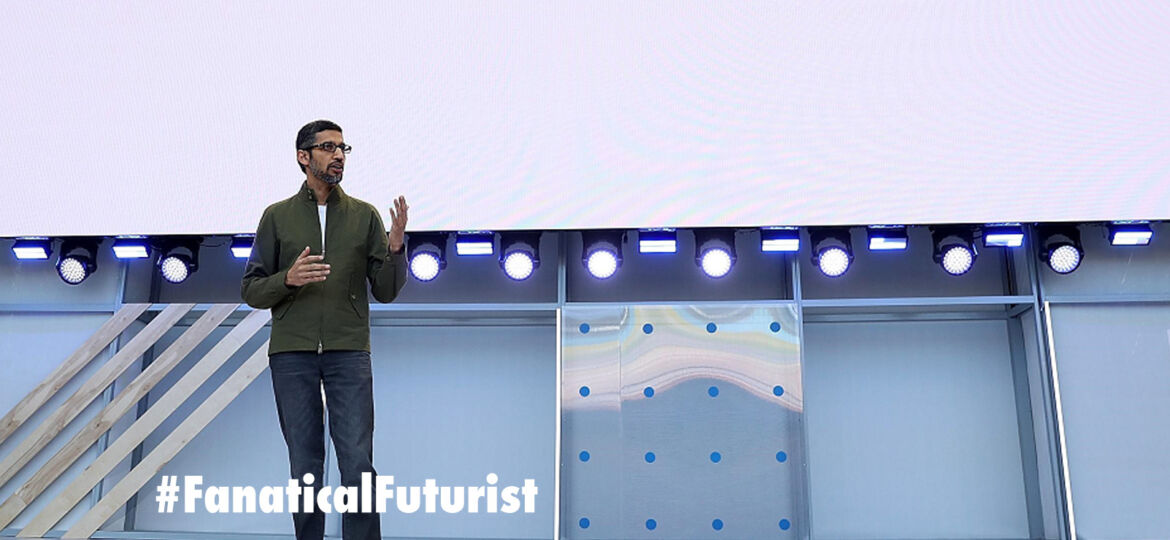
WHY THIS MATTERS IN BRIEF
I’ve been saying this for a long time, very soon you won’t know whether the content you’re consuming was generated by a human or a machine, and Google’s latest product, Duplex, moves us all one step closer to that time.
At Google’s I/O developer conference this week there was, as usual, a flurry of news, but the story that caught most people’s attention was a new product called Duplex, an Artificial Intelligence (AI) based on Google’s phenomenal DeepMind Wavenet platform that I’ve discussed before, that enables Google Assistant to make phone calls for you while sounding convincingly human, a phenomenon often referred to as uncanny valley, complete with “umm’s” and “ahh’s.” It’s also the same technology that will also, asides from booking haircut appointments for you, take the whole fake news issue, and the creation of “convincing content,” of any ilk, to a whole new level, and if you want a view of this future then check out this fake news video clip of Obama from one of my keynotes last year, these articles, and this scarily good hi definition neural network charged bot called Ava.
In the demo, Google Assistant goes back and forth in conversation with a person for about a minute to make a haircut reservation, and in another demonstration, Google Assistant made a reservation at a restaurant.
Listen to Duplex in action
Duplex is still an experiment, CEO Sundar Pichai explained, that will continue with user testing this summer, but despite taking up less than two minutes in more than two hours of product rollouts and upgrades, its debut may mark a noteworthy moment in the history of a field known as Conversational AI, or in other words, the ability of an AI to hold a convincing, streamlined conversation with either another AI, or another individual or entity. Duplex is also one of the first publicly known instances of a bot proactively working on a human’s behalf in the “real” world.
Strangely enough, Duplex is not yet publicly available and barely 48 hours old and there already appears to be a series of misconceptions about it.
First, it’s not the phone call that bothers people. It’s the tone of Duplex’s voice.
If Duplex had the same robotic voice we’ve heard for decades from automated systems handling calls for banks and the like, I don’t think its debut would have made as many waves. The reaction comes up because Duplex uses DeepMind’s crazy good WaveNet technology that last year advanced so much it was able to go from robotic voice to being able to fool people they were listening to a real person in just under a year, this alone means that any inflections or tones that gave the platform away as an AI this year will, next year, be gone.
Second, according to Pichai, despite how the demo played out, in the real world Duplex may not begin a call with the obligatory “Hello” or “Hi” that would come out of a human’s mouth. Duplex calls will be preceded by a message telling the human on the other end that they’re on the phone with a robot and the system will also allow businesses to opt out of receiving such robo-calls. But let’s face it, other less “trustworthy” companies, or even cyber criminals, won’t be so accommodating… imagine, for example, your elderly father or mother getting a call that convinces them to transfer their life savings to an account in Nigeria and you already get the downside of this tech – something, again, that no government is discussing or regulating against.
The third point is that Duplex may not require user involvement after they ask Google Assistant to schedule an appointment, but similarly at the moment it’s not a fully autonomous system. In instances in which the AI fails in attempts to converse with the human on the other line when making a reservation, Duplex will transfer the call to a human operator.
Then lastly, and most importantly, Duplex is the start of something much bigger than phone calls. It’s the beginning of the idea of an AI assistant acting on a user’s behalf in the world, and someday that same assistant could act on your behalf while mimicking your voice – something that again was made possible last year thanks to a company called LyreBird whose AI technology can clone voices with just a minute of audio, and Baidu, whose AI recently also mastered the same trick.
The future will be much crazier than you think, and it’s likely that you’re already starting to think it’s pretty crazy…

















[…] for years by various companies. In 2018, Google demonstrated that a computer can do things like call a hair salon to make an appointment for a user or contact a restaurant to book a reservation – all by […]